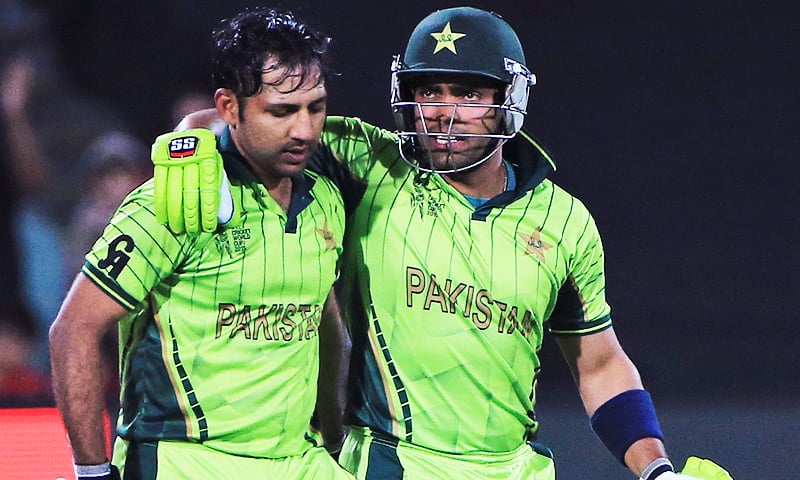Like an entire nation unsure of its off stump
 |
 |
Like a whole nation unsure of its off stump
When Pakistan stepped up against Ireland in their winner-takes-all encounter at Adelaide on Sunday, the nation had already been through a swift shift in disposition; the atrocious performance against India and West Indies, the scare against Zimbabwe and the splash of seam and swing against South Africa all within a fortnight.
The scars from the 2007 Saint Patrick’s Day event in Jamaica felt fresh all of a sudden and the memory of Bob Woolmer scratched upon a deeply buried wound.
Sunday morning in Pakistan was dawned in high emotion and immense anticipation. Everyone expected Pakistan to win but not all of them had complete belief in Pakistan’s success. Doubts ranged from ability to intent and consistency to conviction, like an entire cricketing nation unsure of its off stump.
While Pakistan’s mercurial performances lead to apprehension amongst its well wishers, their anxiousness against the 'minnows', if we can still dare to refer to them as that, is completely unwarranted if not entirely unjust.
In games against Zimbabwe, Bangladesh and the Associate Nations, even though there have been many close encounters, Pakistan has the most number of wins. Given the records, Pakistan is less than half as likely to lose as Sri Lanka and one third as likely as India, and with the same odds to win as of Australia and South Africa.
In simpler words, Pakistan is the biggest 'minnow killer' in cricket.
 |
While on paper there should have been be little reason for nerves but in a do-or-die situation, “there was more pressure for us to win this game than there would be in the quarter final,” said captain Misbah–ul- Haq after winning the match.
Pakistan’s performance against Ireland was clinical from ball one. There was instant energy on the ground, with Ahmed Shehzad and Umar Akmal, particularly, adding zest to the infield.
Misbah’s ODI captaincy has been questioned on many occasions, however, there has been a marked difference in his bowling changes and field placing since Pakistan reverted to the 'five specialist bowlers' strategy. There seems to be clear intent of playing attacking cricket and searching for wickets. And when the cards are falling right, even the introduction of Haris Sohail into the attack pays dividends. The body language of the team is inching closer to the positivity it has long desired.
Against Ireland, Misbah walked into bat in unfamiliar conditions with Pakistan cruising at 126/2 in 24 overs and only 111 to get with eight wickets in hand. Many wondered whether Misbah was going to take the attack to the Irish and not just win the game, but do it in style? Display a show of strength and dominance, perhaps.
Predictably, there was no such rush of blood from Misbah, his first 11 balls resulted in three singles. And out of the blue, bam, the ball went over mid-on for four. A few dot balls and bam, over mid on again, this time for six. As usual, Misbah was not in a hurry, unfazed by critics, undeterred by media reports. He typically slowed the game to his own pace and played it on his own terms. He was hit wicket at 39 off 44 balls, with Pakistan requiring only 30 to win.
 |
| Brothers in arms. Umar Akmal, right, congratulates Sarfraz Ahmed after Pakistan's victory over Ireland. — AP |
At the other end, young Sarfraz Ahmed was pacing his innings to perfection before he came to a sudden halt after reaching 90 in the 38th over. It took him another seven long overs to reach his hundred. He was in his nervous nineties for what seemed like eternity.
After getting to his hundred and equaling Ireland’s score, Sarfraz dead-batted four deliveries with no intentions of hitting the winning runs. He gave the honour to Umar Akmal who had been patient enough and had let Sarfraz reach his hundred at leisure.
The commentators suggested that this timid approach could not help Pakistan and would send out the wrong message. Team Misbah, however, seemed to have more important agendas. Like Sarfraz reaching his hundred and remaining not out, even if it took another four overs. Like Umar and Sarfraz respecting each other’s space on the turf and punching gloves at every given opportunity.
A sports junkie can easily spend a sleepless night in anticipation of a game the next morning, or be so entrenched in thought as to envision the match in a preceding night’s dream. The inability to influence events and being completely absolved of failure also stimulates its own set of emotions and behavior.
While all sports fans can feel similar anxiety, the Pakistani cricket follower goes through a host of sentiments that an outsider remains oblivious to. Fear of batting collapse, dropped catches, mixed with patches of brilliance and exuberance. Horrors of betrayal blended in flashbacks of inspiration and glory. The life of a Pakistani cricket follower goes from extreme despair to ecstatic delight extremely fast, and is jolted back into reality even faster.
There is nothing wrong in Pakistan playing with a batting strategy that is accused of being ancient, as long as they can restrict teams to smaller totals and win games. It is like enjoying a Clint Eastwood classic where a gun slinger keeps outwitting his enemies. However, one remains unsure of how long cowboys with revolvers can survive in a world with Glocks and Desert Eagles.
A nation that continuously craves for madness has been injected by one man’s method of maintaining sanity. The display of strength in team Misbah is not of aggression and dominance, but of patience and union. The power of which, cannot be underestimated and should never be undermined.
Shaan Agha tweets @shaanagha1 and can be found on Game On


